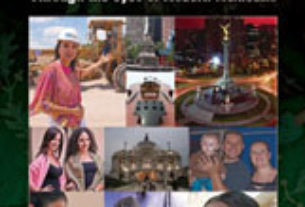It’s hard for a reader to know exactly what to make of this one. Is it fiction? Or is it biography? Or is it something in between?
In an author’s note Ms. Mujica states: “Although events in Mexican history and in Frida’s life provide the general framework, many incidents and characters portrayed here are the author’s inventions.” And: “Although many of Frida’s biographers mention her younger sister, Christina, I have reinvented the youngest Kahlo girl to make her a perspicacious witness to Frida’s life.” She continues: “My intention in writing Frida was to capture the essence of Frida Kahlo’s personality, not to document her life. I was particularly interested in what it might be like to be the unexceptional sister of such an exceptional woman….”
I draw attention to Christina because there are many times when the reader can be forgiven for thinking she’s the main character in the story, although the book’s title suggests otherwise. The entire narrative, for example, consists of Cristi talking to an American psychiatrist, although I’m not sure it’s explained why she’s evidently undergoing therapy. In a way this is Cristi’s autobiography, not necessarily Frida’s biography.
Cristi is always putting herself down. In the early pages you get a lot of this sort of thing: “She (Frida) was an adorable child. Not like me. I was tubby and kind of dull. I guess I have to admit it. In those days, she was the pretty one.” Thus, Frida is always Daddy’s pet while Cristi is the envious one in the background.
Later in the narrative we read: “Sometimes I feel I’ve lived my entire life through Frida. She was the one who had the adventures; she was the one who experienced magnificent emotions. I wore my life secondhand, just as I wore Frida’s old clothes.”
Maybe the best way to approach this story is simply to ask oneself whether or not it’s an enjoyable read. After all, do we readers really have to worry about the truth or the veracity of every nuance of Frida Kahlo’s life? Of course we don’t. And couldn’t you apply the same questions and doubts to an account of anyone’s life? So – to answer my own question – yes, I found it an enjoyable read.
I was surprised to find that Frida never originally set out to be a painter. Rather, she wanted to be a doctor. However, a serious bus accident at age 15 left her with a fractured spine, a crushed pelvis and several other injuries. She was forced to wear a plaster corset for the rest of her life. Also, later in life she contracted polio in her leg. She was probably never free of pain.
Frida was in her late teens when she met Diego Rivera, the famed muralist, the third prominant character in this story. It sounds like love at first sight although it’s hard to figure out why. Cristi describes Rivera as “the ugliest man I’d ever seen, ugly enough to win an ugly contest. A mountain of suet that had to be stuffed with a trowel into those filthy overalls he wore.” Indeed, the photos I’ve seen of him with Frida since reading this book tend to bear that out. They show a three hundred pound monster hugging a tiny attractive little woman. However, in any event, he and Frida married and he was the one who turned her on to painting. The other surprising thing about Rivera was that he seemed to have no problem at all attracting women. He’s in the sack so much you wonder how he ever found time to get all those murals done. At one point, even Cristi goes to bed with him. (An attempt on her part to get even with the sister she seemingly has always envied)
The tempestuous on-and-off and off-and-on relationship between all three of them continues for many many years with Diego not always being faithful to Frida – nor is Frida always faithful to him. At one point they divorce, but sometime later they remarry. Frida also becomes pregnant a couple of times but, because of her physical problems, the pregnancies end in abortions.
Along the way Frida also flirts with communism and even has an affair with Leon Trotsky when he and his wife are in Mexico.
See what I mean about this book? You can’t help treating it like a biography, rather than a novel.
Whatever it is – bio or fiction – things never stop happening in this psychologically complex and highly emotional tale. It’s always interesting even though I didn’t always find the characters all that likeable. Indeed, there are a few moments – like Frida’s tantrum on page 343 – when I found her completely intolerable.
In my humble O: Well worth a look. But just sit back and enjoy. Don’t worry about whether you’re reading a novel or a biography.
Frida – A novel based on the life of Frida Kahlo
By Barbara Mujica
Penguin Books. Paperback. 363 pages. 2001
Available from Amazon Books: Hardcover

